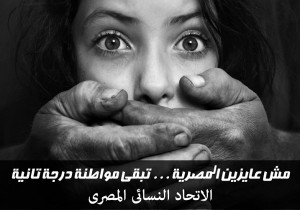
Courtesy of Egyptian Feminist Union Facebook page
Egyptian women have been at the forefront of many recent changes taking place in Egypt, but a unified feminist movement is still a long way off. “We have had a complete lack of feminist intellectual and enlightenment movements for almost 60 years,” says Hermas Fawzy, of the Egyptian Feminist Union. The union is one of Egypt’s most prominent post-revolution attempts to gather grassroots support for female equality.
The union started in pre-revolutionary Egypt with well-known feminist Nawal Al-Saadawi. “Doctor Al-Saadawi wanted to start a feminist movement for quite some time. But she was stormed by [former First Lady] Suzanne Mubarak because her ideas were radical, socialist and progressive. Now that Mubarak is deposed of, what better chance do we have at implementing her dream than now?” asked Fawzy.
Fawzy said the international women’s day of 2011 on 9 March signaled a red flag, and harassment was rampant within a short time after the revolution’s 18 days. Al-Saadawi, who has been very vocal and active in the January uprising, is involved in the union as a sort of “spiritual godmother” as Fawzy terms it.
“Women are often the recipients of violence and domestic abuse,” said Fawzy. “This oppression on a small scale has much bigger implications for society and eventually the country. When one half of the population is oppressed, everyone suffers. Children understand implicitly that boys are better than girls and women are treated as second-class citizens. This translates into a troubled society.”
Though the question seemingly revolves around women, there are many men involved in the union and Fawzy said the issue is not exclusive to women even if it is about them. “Just as one does not have to be poor to want social justice, you do not have to be a woman to fight for equality. We need the state to start treating people equally and not on the basis on gender. This is a humanistic project that has to do with human rights above all. Our goal is for women to be treated as human beings and equal citizens.”
The union has been active both in trying to achieve broader revolutionary goals, such as deposing the Supreme Council of the Armed Forces and writing a representative and inclusive constitution, but also with issues specific to their raison d’etre, such as violence against women by the state during protests and virginity examination tests by the military.
“The main issue facing us today is, of course, the constitution. The constitution will serve as solid ground for us to stand on in our long fight. We need an equal legal basis so we can address an equal cultural basis,” said Fawzy.
Fawzy said many difficulties lie ahead and the number of people willing to fight is disproportional to the oppressive lives women lead in Egypt. “You would think that every woman out there would be trying to reclaim her rights but sadly it is not the case, especially with the conservative powers taking over the country. We have many who are receptive to our ideas but it is generally a difficult time.”




